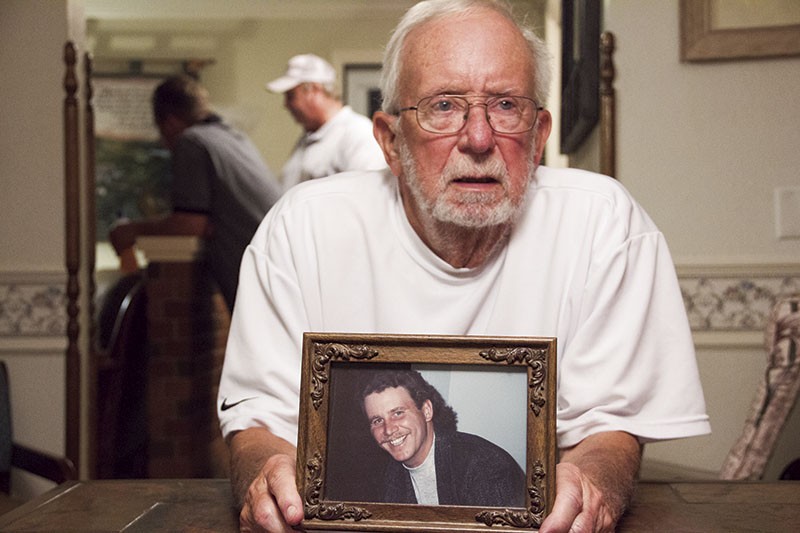
When Kinsky's letter showed up in Tim's cell last year, the middle-aged inmate had all but given up hope. The prosecutor's missive, he says, "was like a light coming on at the end of the tunnel."
But that tunnel has a gatekeeper: Governor Jay Nixon. And commuting Tim's sentence — thus making him eligible for parole — doesn't seem high on Nixon's to-do list.
Until recently, Nixon largely ignored the pleas of the thousands of offenders serving lengthy prison terms in Missouri. Many of those sentences stem from the harsh drug laws passed in the 1980s and 1990s.
"These policies are coming back to haunt us," says John Ammann, a supervisor in Saint Louis University's civil litigation clinic and the lead author behind Tim's petition for clemency. "People are starting to realize that this tough on crime attitude is not a good situation. We locked non-violent people up, like Tim, for the rest of their lives. We're spending a lot of money to incarcerate people who could be productive citizens."
In his seven-plus years as governor, Nixon has commuted the sentences of only a handful of Missourians, almost all who were convicted of the pettiest of crimes and who already served their full sentences. He commuted the sentence of just one person who was incarcerated at the time — a man named Jeff Mizanskey.
A Sedalia pot dealer, Mizanskey had been serving a life sentence for transporting several pounds of marijuana in 1993. Because of Missouri's unique three-strike law for drug offenders, Mizanskey — who had two previous felony pot busts on his record — was automatically denied eligibility for parole.
Riverfront Times reported on Mizanskey's sentence in 2013, and he quickly became the focal point of a burgeoning political movement of cannabis activists and prison reformers. In August 2015, Nixon commuted the 62-year-old grandfather's sentence. One month later, after an appearance before the parole board, Mizanskey walked free.
But although a change.org petition has gathered 90,000 signatures supporting Tim's release, he is no Jeff Mizanskey. Mizanskey was messing around with marijuana, which a handful of states have since legalized. And though popular opinion is shifting on the drug war, Tim is a former meth cook. People feel differently about meth — one reason the laws that gave Tim a life sentence were passed in the first place.
"The public's perception of people who use meth and produce meth is very dark," concedes Amman. "They don't consider the social, economic and medical factors that lead people to drugs. Tim was caught up in that. He had an accident, back pain, prescription pills. For some people it leads to heroin, and for him it led to meth."
But arguments about drug addiction and chronic pain might not sway Nixon — and they certainly haven't changed the opinion of the woman who was pulled from Tim's trailer as a teenager in 2003. Now 30, the woman spoke to RFT on condition of anonymity.
She says she met Tim several weeks before the 2003 arrest, through mutual friends who had first given her meth at a party. She would spend the night in the cluttered and smoky trailer, with Tim supplying meth and alcohol. The trailer had no running water and no bathroom.
Tim was prone to fits of rage. "He was always threatening to kill everybody," she says between bouts of sobbing. "If I didn't do something or made him mad, there was threats toward me." The memory of Tim's anger, not to mention the trauma of waking up to police raiding the trailer, has never left her. When she learned that Tim was seeking a commutation, she says the years-old terror came rushing back.
There are things she won't talk about, not to even to her doctors or therapists. She remembers rebuffing Tim's sexual advances, but admits that there are swaths of time she can't account for. She says she spent much of her time in the trailer passed out on a bed in a back room.
"He can play it to a tee that he has been rehabilitated, but I would put a million dollars I don't have that he isn't going to change," she says. "If that guy ever gets out, I will feel so unsafe and terrified. I don't know how I'll manage day by day. I feel like he'd be a danger, and not just to me but to any young girl."
Confronted with the woman's portrayal, Tim begs ignorance. He regrets "the entire thing, everything that ever happened," he says. But he can't remember himself as the raging and temperamental man in the woman's memories. "I am not the same person I was at the time. I know that. If I get out, I need to start a new life."
That people can change — it's an argument repeated by prison reformers since time immemorial. For those like Kinsky and Ammann, condemning a human being to die in prison is a punishment of last resort, reserved only for the most dangerous and unredeemable. Tim Prosser, they say, is not that.
As it stands, Tim has exhausted his appeals and has no other legal recourse. No one knows if Nixon will be swayed by Tim's assurances or Kinsky's regrets, but there are signs of a broader shift in how clemency is applied in the U.S. In August alone, Barack Obama commuted the sentences of 325 federal inmates, including 102 with life sentences for drug crimes. It was the greatest number of commutations ever enacted in a single month by a U.S. president.
"What we do in clemency, we don't look at things as an excuse," says Ammann. Indeed, even in a system honed over decades as an instrument of punishment, Governor Nixon is afforded the power to chart a path of human compassion.
Nixon has so far refused to act with such mercy. But Tim has hope. He still believes that people — even a governor, even a meth cook, even a prosecutor — can change.
Editor's note: A previous version of this story misstated the number of Missouri offenders currently serving probation and parole. About 15,000 convicted offenders are out on parole, not 20,000 as stated in the story. Roughly 43,000 are serving probation, not 50,000. We regret the error.
Follow Danny Wicentowski on Twitter at @D_Towski. E-mail the author at [email protected]





